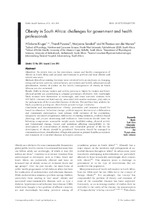Obesity in South Africa: Challenges for government and health professionals
Date
2005Author
Kruger, Salome H
Puoane, Thandi
Senekal, Marjanne
Van Der Merwe, Theresa M
Metadata
Show full item recordAbstract
OBJECTIVES: To review data on the prevalence, causes and health consequences of
obesity in South Africa and propose interventions to prevent and treat obesity and
related outcomes.
METHODS: Data from existing literature were reviewed with an emphasis on changing
eating and activity patterns, cultural factors, perceptions and beliefs, urbanisation and
globalisation. Results of studies on the health consequences of obesity in South
Africans are also reviewed.
RESULTS: Shifts in dietary intakes and activity patterns to higher fat intakes and lower
physical activity are contributing to a higher prevalence of obesity. Few overweight
black women view themselves as overweight, and some associate thinness with
HIV/AIDS. Glucose and lipid toxicity, associated with insulin resistance, play roles in
the pathogenesis of the co-morbid diseases of obesity. Elevated free fatty acids in the
black population predispose obese black patients to type 2 diabetes.
CONCLUSION & RECOMMENDATIONS: Obesity prevention and treatment should be
based on education, behaviour change, political support, intersectoral collaboration
and community participation, local actions, wide inclusion of the population,
adequately resourced programmes, infiltration of existing initiatives, evidence-based
planning, and proper monitoring and evaluation. Interventions should have the
following components: reasonable weight goals, healthful eating, physical activity
and behavioural change. Genes and mutations affecting susceptibility to the
development of co-morbidities of obesity and vulnerable periods of life for the
development of obesity should be prioritised. Prevention should be managed in
community services, identification of high-risk patients in primary healthcare services
and treatment of co-morbid diseases in hospital services.

